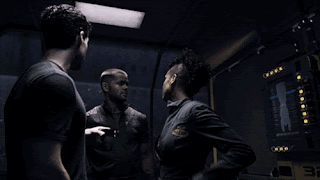In The 23rd Century Humans Have Colonized The Solar System.
The U.N.
Controls Earth.
Mars Is An Independent Military Power.
The Inner Planets
Depend On The Resources Of The Asteroid Belt.
Belters Live And Work In Space.
In The Belt Air And Water Are More Precious Than Gold.
For Decades,
Tensions Have Been Rising.
Earth, Mars And The Belt Are Now On The Brink of
War.
All It Will Take Is A Single Spark.
The Expanse (2015-) is the story of humankind pushing into a new frontier, outer space, and taking residence there.



This achievement is in its infancy and yet people are people. We have advanced technologically to reach into the stars and colonize, but humanity has yet to evolve in parallel. Racism, prejudice, mistrust, brutal crimes, greed, power plays all remain and humanity continues to eek out an existence between its power brokers in this arguably bleak future.
The three players are Belters, Earthers (Earth) and Dusters or Martians (Mars), an independent military power. All of them struggle for their respective place in this new universe. And as only man can, agendas are indeed unique and irrespective of one another yet somehow a fragile functioning relationship between these players remains.


The Expanse is a story filled with a rich narrative, a fascinating space mystery coupled with noir sci-fi beautifully laced together with a large ensemble cast of intriguing characters over the run of a single ten episode season beginning with The Expanse, Season One, Episode 1, Dulcinea.
Like the book on which The Expanse is based, Leviathan Wakes (2011) by James S. A. Corey (pen name for Daniel Abraham and Ty Franck), with its chapter by chapter focus on Holden and Miller, the series alternates between two primary characters.

The two men are space station Ceres Detective Joseph "Joe" Aloisus Miller and spaceship Canterbury Executive Officer (XO) James "Jim" Holden.
The hunky Holden is the reluctant second officer of an ice-hauler called The Canterbury.
The far less idealistic Miller, best described by actor Steven Strait (Holden) in SciFi Magazine, is "this incredibly jaded, worn-down, noir-esque" investigator.
In Dulcinea, Miller even says to his partner, "Look don't try to save the whole station in the first day, pace yourself."

In Corey's book, Octavia Muss, Miller's former partner, even muses. "He'd had to know that he was the station house joke. The guy who used to be good. The one who'd lost it" (p.170). But Miller doesn't see that.
Ultimately despite their stations, these two good men despite their flaws will inevitably cross paths intersecting over Juliette Mao and the events to come surrounding The Canterbury. It is their instinctual character that will drive them "together ideologically and philosophically."

Though Jane plays the part of Miller as a world-weary man who has seen awful things, lived on the edge and ultimately lost his moral compass or idealism, yet there is a soulful charisma to the character. Jane brings everything of himself to his performance himself even transforming physically as much as Jane can to assume the identity of Miller. Sporting a close-cropped hairstyle on one side, long hair on the other and a trademark fedora Jane positively loses himself to the role arguably his best since HBO's Hung (2009-2011).

Jane's Miller reminds us of a throwback to the detective noir detectives of a by gone era. Think even Michael Cimino's Year Of The Dragon (1985) and it's lead Mickey Rourke as the fedora-wearing Stanley White.
Corey genuinely draws from a long legacy of the flawed hero and the Miller character indeed channels and echoes some of the writing built into Rick Deckard in a small film classic built long ago called Blade Runner (1982) by Ridley Scott as well as Phillip K. Dick's own Do Androids Dream Of Electric Sheep? (1968). Despite being law enforcement (for Earth-owned Star Helix Security on neutral station Ceres) Jane's own anti-hero reflects the nature of this classic hero type and the ambiguous, conflicting aspects found in the state of mind of the hero's journey.

As far as appearances, Jane's physical modifications are intended to echo life in zero-g and in space. Belters in particular, born and raised there, are noted for being thin even gaunt and gangly.
But both lead characters and the respective supporting characters accurately reflect and embody the look and spirit of their literary counterparts.
These important performances across the expanse are note perfect by some exquisite casting.

Dominique Tipper as engineer Naomi Nagata, Cas Anvar as Alex Kamal, pilot of The Canterbury and Wes Chatham as gruff mechanic Amos Burton round out a fantastically cast group. There are indeed deep shades of grey in morality within the world of The Expanse. Decent people are inevitably fighting against their nature out of pure survival in the Belt. They have essentially buried a desire to do what's right, as many of us are inclined to do, out of an instinct to live in a very tough place. The word-building and character-building for The Expanse by creators Mark Fergus and Hawk Ostby draws extensively, faithfully and wisely from the immense source material, Leviathan Wakes, by James S.A. Corey is nothing short of striking in this first entry within the expansive world of The Expanse.


For fans of both the book and the series they will enjoy the subtle differences between the two mediums. Elements are exclusively created and original to the series while other elements are omitted from the book, but the material for the series remains largely true to the source.
The opening of The Expanse immediately draws from the book's introduction of Juliette Mao and her horrifying discovery aboard the ill-fated ship The Scopuli (a ship design with a nod toward Space:1999's The Eagle).
An introduction to Miller follows. He works the beat on Ceres Station where the Belters live and pass through goods and services rendered.

At a crime scene a sense of where Miller is in his career is revealed. He literally walks over a bloody patch and a knife used at the crime scene. In other words, this is business as usual.
As the inaugural episode plays out there is something utterly refreshing about The Expanse.
The series intertwines the kind of complex political weave of a world like J. Michael Straczynski's Babylon 5 (1993-1998) and has the kind of literary chops of that writer's work. Yet The Expanse also adds the kind of sinister unknown and darkness to its mystery that once inhabited a series like Space:1999 (1975-1977). That comparison is not made lightly.

Too often science fiction is created without the credibility of science fiction in play, which The Expanse maintains in spades. Often the genre becomes a springboard for action adventure but light on a literary narrative like Dark Matter (2015) or Stargate SG-1 (1997-2007). And there's a place for those series too. Not here.
Battlestar Galactica (2003-2009) embraced the darkness of humanity. Stargate Universe (2009-2011) took its franchise in a new direction exploring both the darkness of humanity and space. The Expanse takes this approach to new levels for television.

Blu-Ray.com wrote a solid review for the series. This is an excellent rendering of the series too. “Stylishly dour, insightfully dense, and incredibly detailed, the show tells a story that's fantastically futuristic but tangibly relatable and aware, exploring the human condition as it is and will be in the broader prism of the politics and social structures of a future that looks different but feels eerily the same. Issues of equality, individual and collective identification, and nefarious, underhanded dealings dominate many of the program's broader arcs, eschewing any kind of hopeful Star Trek vision for the future in favor of the contrast that is technological evolution with species stagnation. The series' insistence on downplaying the technology -- it's not at all sleek, colorful, or in any way visually agreeable -- plays up the idea that man is not more than his place in the stars, and that, indeed, his ability to expand his horizons only seems to close in his opportunities to progress as a species.”

Dulcinea stays true to the first five chapters of Leviathan Wakes. The introductory world colorfully taps an H.P. Lovecraftian-like aesthetic rather than the utter darkness of Battelstar Galactica. Through show creators Fergus and Ostby all involved literally bring the pages of Corey's literary word to life as faithfully as adaptations come and The Expanse is all the better for it.
(SPOILERS) To bring focus on the kind of science fiction thrills and dramatic chops The Expanse has in store, look no further than the final two sequences that conclude Dulcinea. Dulcinea closes with two outstanding sequences. One is a thrilling science fiction moment and the other an entirely human epiphany. In actuality though, both Miller and Holden have moments of self-realization that their destinies matter and are important. In effect, they have a voice in what the future will be in The Expanse or at least how they will respond to unfolding events.

Miller, who seemingly walks through life and through the motions having missed "the boat" on certain things in his life, pauses. For example, the book refers to an ex-wife, Candace. Here he speaks of a life without children. Like he does in the book Miller interacts with a man and his child, but the series draws upon the sparrow's grace and beauty to greater emphasis and pronouncement to the benefit of the Miller character. The sparrow is mentioned briefly in a segment from Chapter 20. "One of the girls on the commons shrieked and the others laughed. A sparrow flew past, its wings humming in the constant recycler-driven breeze" (p.205).
Miller essentially awakens through this exchange and an interaction with the man and, in particular, both the child and the little bird. The fluttering, hovering bird and child offer Miller a spark as these tiny, fragile lives bring Miller to life in the final minutes of Dulcinea. The moment is an awakening, a realization to the mesmerized Miller caught in the moment that things matter, life matters, perhaps even reinvigorating this lost man.

In fact, it is the moment that infuses Miller with a passion and an activation to care about Juliette Mao, the missing girl introduced earlier in a horrific moment aboard The Scopuli, with whom he has been tasked with finding by his boss Shaddid. No longer just a dead end missing girl case of which Miller will simply phone-in and do the minimum for his boss, Shaddid.
She too undervalues the assignment. Instead for Miller Mao's life begins to matter, his own self-respect and value also means something here, as he sits and watches the bird and a girl at play from his apartment on Ceres. Suddenly he projects value on what he sees as beautiful and important. As the book notes in Chapter 16, "Julie...Not his job. Not his reputation. ... The one that mattered" (p.172). It's a lovely moment enhanced with even more potency by Clinton Shorter's score. The little girl is breathing air on Ceres that is filtered and suddenly backroom deals and blatant disregard for maintenance of those filtration systems falls by the wayside as Miller invests himself on making a difference for the little girl. This carries over to his own sense of mission for Mao.

The second and final act is a thrill ride, the spark that could ignite war, whereby the Knight (a small vessel from within The Canterbury) is alerted to a mystery surrounding The Scopuli before being torpedoed by an unknown vessel. With just moments to spare the Knight takes cover behind an asteroid avoiding incineration. But the torpedoes weren't intended for the Knight but rather The Canterbury herself. But there is no time left for Holden's lover and those aboard The Canterbury, the intended target, are wiped out as the ship explodes in an expansive nova of light.

As actor Steven Strait, who plays Holden, noted in SciFi Magazine (Feb 2016, p.57), this event is "really the fuel that pushes Holden to become the man he does." He adds, it "does change Holden into what he becomes. There's a major piece of him that feels like he's at the service of something that is much greater than he is." As the episode's title suggests, there is a sweet moment here in these discoveries.
Both Holden and Miller have their awakenings or revelations and come to terms with realizations that there is something much bigger than themselves in play in the final moments of Dulcinea.
This is a pleasant juxtaposition to a rather grim version of man in a rather bleak universe. Amidst the rather grim struggle there is hope.

In Dulcinea the sparks are flying.
The Expanse has it all and Dulcinea sets the stage for what could be an epic sci-fi series with a slough of source material beginning with Leviathan Wakes (Season One) followed by Corey's expansive source material in the form of Caliban's War (2012), Abaddon's Gate (2013), Cibola Burn (2014), Nemesis Games (2015), Babylon's Ashes (2016) for successive seasons as well as novellas Gods Of Risk, The Churn, The Butcher Of Anderson Station and The Vital Abyss. There's a reason The Expanse has been compared to George R.R. Martin's Game Of Thrones (2011-present) and why he crowned the series "interplanetary adventure the way it ought to be written."

The Expanse is an ever-expanding tale of our inter-connectedness as represented by three disparate but ultimately connected powers. It is part political conspiracy thriller, noirish detective mystery and deep space odyssey that coalesces into a unique science fiction narrative. The Expanse plays with conventions to the point of creating something truly special. Initially, there are so many characters it is a little jarring and perhaps difficult to connect with emotionally as a great deal of information is established and introduced in Dulcinea. Still, with patience, The Expanse promises great things and it is a series that deserves your patience. It will earn it.

In play is a science fiction mystery suspense thriller that plays with the kind of complex future world that once made Blade Runner such a haunting, mesmerizing vision. Unlike film, The Expanse is able to push the boundaries of that world through television. The Expanse is like science fiction poetry and is likely to remain one of a kind.
This is a series that is of the highest caliber. It is to sci-fi what The Americans (2013-present) is to a Cold War thriller, what Longmire (2012-present) is to a contemporary crime Western. In science fiction it's appointment television of the highest order even if it likely never touches an audience outside of the genre. But if you're a science fiction fan The Expanse is essential viewing and dismissing it would be crime enough to place you under the watchful eye of one Detective Josephus Miller.

Star Wars: The Force Awakens also arrived in 2015, but the true, legitimate science fiction forces that arrived in 2015, based on Leviathan Wakes, did so through the arrival of the epic The Expanse. In Spanish, Dulcinea refers to a sweetness and it doesn't get much sweeter in science fiction than the nirvana that is The Expanse.
Writer: Mark Fergus/ Hawk Ostby. Director: Terry McDonough.
















































































No comments:
Post a Comment